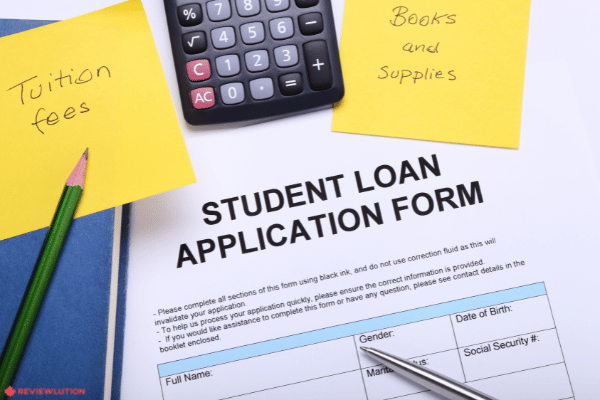Do Student Loans Affect Credit Score in Canada?
Post-secondary education is not cheap. Many students need financial assistance to support their studies and pay their tuition. Student debt statistics in Canada have found that bachelor’s, master’s and doctorate students finish their education with at least $26,075 in student debt.
After graduation, students are in a bind of repaying their student loans. But do student loans affect credit score?
Let’s find out!
How Can Student Loans Negatively Impact Credit Scores?
Student loans work just as instalment loans. Borrowers get a lump-sum of funds which must be repaid over a certain period. With each instalment, the borrower will be repaying the principal amount plus the interest on the debt. Canadians have options to choose between federal and private loans.
Student loans have variable interest rates which fluctuate depending on whether market prices go up or down. But the good thing is that students can change their rates to a fixed rate down the line. Also, the monthly payments can increase as interest rates go higher.
However, students should be aware that taking out a student loan may affect their debt-to-income ratio. If your debt-to-income ratio becomes too high, can take a hold of your borrowing power in the future.
On the other hand, student loans are an excellent option to build your credit history and obtain a good credit score. But then again, you should keep in mind that missing your payments will take a hit on your credit score.
Let’s dig down further into how student loans impact your credit score.
Missing payments
Just like with any type of credit, missing your monthly payments will negatively impact your credit score. This is one of the most important factors when determining someone’s credit score.
And the first thing a lender will do is perform a credit check to determine your score.
If it happens only once or twice, it may not hurt your score severely. But if it becomes a regularity, it will take a huge toll on your overall score. Not only do you lose significant points of your credit, but might as well fail to catch up with your future payments, due to the accumulation of late payment fees.
Another consequence of missing your monthly payments is that if it exceeds the 30-day overdue, they will be reported to credit bureaus. Plus, it will be marked on your credit report.
Loan payments that are more than 30 days overdue (depending on the lender) are often reported to the credit bureaus and noted on your credit report. When this happens, your credit score will likely dip.
You might be interested: Loans in Canada With No Credit Check: 2022’s Best Lenders.
Defaulting
Defaulting on a loan is always a bad move. Yes, anything can happen that might dip your balance and prevent you from making on-time payments. But a lender does not care about the reason. Defaulting will only result in a significant drop in your credit score points.
As per the National Student Loan Service Center in Canada, students go into default after 270 days of missing payments. Your default will be recorded on your credit report and will hurt your score as a result.
Your student loan is sent to collections
After going into default, your account will be written off as a loss, better known as a charge-off, meaning, no future charges can be made. After that, the creditor will send your charged-off account to collections. However, it doesn’t mean that you’re discharged from repaying the student loan. You still need to pay the charged-off debt.
Your charged-off account will be recorded to your credit report and will continue to stay so even if fully repay your outstanding debt. The default will remain on your credit report for up to 6 to 7 years. This can severely damage your credit score and make it more difficult for you to qualify for any loan in the future.
Did you know that your payment history makes up 35% of your total credit score? However, making an effort to pay off your outstanding balance even after your account has been charged off, will help you to get a record of debt resolution. This, in turn, will lessen the damage made to your credit score.
It’s important to highlight that since April 2021, the accumulation of interest on student loans has been suspended by the Canadian government up until March 31, 2023.
How Can You Build a Credit Score With a Student Loan?
If not mindful enough, student loans can impact your credit score significantly. But besides the negative consequences of student loan debt, does paying student loans to build credit in Canada? Absolutely.
Here’s how can you build your credit score with the support of student loans.
Establish a credit history
Being a student means that most probably you do not have a long credit history, although, not necessarily. Still, at a younger age, you will have a shorter credit history than someone of an older age. That’s the perfect time to start using student loans to establish a solid credit history.
Student loans are a powerful tool to build positive credit. What’s more, student loans also help you to diversify your credit portfolio by adding to your credit mix. To lenders, having a credit mix translates to having the ability to handle multiple types of credit simultaneously.
Having a well-balanced credit history is essential to your credit score because your credit history makes up 15% of your overall score. Your credit history is based on how long your accounts have been active when was the last time you used them and whether are they still active.
Build positive payment history
The better your payment history, the stronger your credit score will be. Even more so, if you have different types of credit at once. Again, adding to your credit mix will also improve your payment history, but only if you manage to pay them on time. The credit mix makes up 10% of your credit score. It might not seem like a significant portion, but it does make a difference in the long run.
Having a positive payment history, means you stand a better chance of getting approved for future loans of different kinds. In this case, student loans impact your credit score but in a positive way. If you have ever heard the phrase “a student loan is a good debt”, it refers to the fact that a student loan strengthens your credit portfolio and lets you capitalize
Having a credit mix and a positive payment history makes you ten times more favourable to lenders and they are more willing to offer you their services.
Can Credit Scores Affect Your Ability to Get a Student Loan?
Just as with any other type of loan, your credit score will affect your ability to get a student loan as well. Canadian students have two options for student loans – a private lender or a federal loan (government-supported).
A Private lender
Private loans are offered by financial institutions and have a more strict credit policy in comparison to government loans. Taking out a student loan from a private lender is convenient if the federal loan is not enough to cover your tuition fees.
Again, private loans are approved based on your credit history and credit score. Students that have good creditworthiness can get loans at lower interest rates, while those with bad credit scores, will pay fairly higher loan interest.
But you can always look for a co-signer to boost your application and help you get approved. This is very helpful for students with bad credit.
Private student loans come with the advantage of paying only interest monthly payments instead of paying the principal loan. Paying interest-only payments means that your payments will be lower at the beginning. But after that period is up, you must also start paying the principal along with the interest.
The repayment time frame for private student loans is from 10 to 20 years. Also, some private lenders may require students to start paying off their loan debt before graduating.
If you’re looking for low-interest credit cards, make sure to check out our article Best Low-Interest Credit Cards in Canada: Who Takes the Crown?
Government
Government student loans have a shorter repayment period of only 10 years. But then again, the funds provided by this type of loan may be lower than that of a private loan.
It’s important to understand that if your payments are overdue by at least 270 days, your student loan will be in default and transferred to the Canada Revenue Agency (CRA) for collection. If this happens, you’ll be charged penalty fees, your credit score will suffer, and the CRA may withhold your income tax refunds. In some cases, your wages could even be garnished or assets seized. And of course, your credit score will suffer because of that.
But the good thing about government loans is that, unlike private loans where there is no grace period, with government loans you have 6 months before start making initial payments.
For instance, most government student loans don’t need to be repaid until 6 months after graduation. Typically this means payments are not needed while you’re still in school. On the other hand, some private student loans may require monthly payments to be made before you graduate.
Federal loans also offer adjustments to your repayment schedule. For instance, if you have insufficient funds to cover the monthly payments, you’re eligible to sign up for an income-driven repayment plan, which is designed to lower the amount you pay every month.
Another option is to apply for deferment or forbearance. This option is to put your payment on a hold only temporarily, until being able to continue with the payments. By doing so, your score is safe and won’t be affected.
How to Manage Your Student Loans?
Student loans impact a credit score. So, what are the things you can do to avoid negative consequences?
Here are some valuable tips to help you manage your student loans.
If you’re a student and want to save some money, check out some helpful tips on How to Save Money as a Student in Canada?
Make higher payments
You can start by making larger payments than your minimum payments are. It helps to reduce the amount of interest and every larger amount you pay goes towards the principal amount.
Thus, your total loan amount will decrease and make your monthly payments much easier to manage. Automatic payments are also something to think about when managing your loan payments. You can set the amount you wish to pay each month, the higher the better, and spare yourself the hustle of paying in person.
Make a lump-sum payment
Any time you make a lump-sum, it speeds up the process of your repayment. You may repay your loan rather sooner if you continue to make lump-sums. The way it works is that your lump-sum goes towards your interest first, then to the principal.
If you want to speed up the process, you can start making lump-sums either during your schooling period or during the grace period. This way, the amount you pay goes directly toward the principal. It also reduces your overall interest rates.
Apply for government assistance
If you correctly assess your financial situation and conclude that it’ll be hard to keep up with the payments, you can apply through the NSLSC for financial assistance. They offer several programs to help students alleviate their financial struggles.
There are several examples of how that works:
- Get a reduction in interest
- Reduction in monthly payments
- Or loan forgiveness but only in extreme cases for which you must show documentation justifying your reason
Just keep in mind that you’re eligible for the loan forgiveness program only if you haven’t exceeded the 90 days overdue.
Conclusion
Before jumping into any decision, think about if you need a student loan in the first place. If you think you do, ensure to understand how student loans work and how student loans impact a credit score.
FAQ
If you go in default, then it will be recorded on your credit report for up to 6-7 years.
Typically, having student loan debt may affect how much you can borrow for a mortgage. Although you can still get a mortgage to purchase your first house, the lower your credit score, the less borrowing power you have.
How many points do student loans affect credit score depends on your loan debt and if you have missed any payments. But your student loan can drop your credit score by as much as 80 points.












